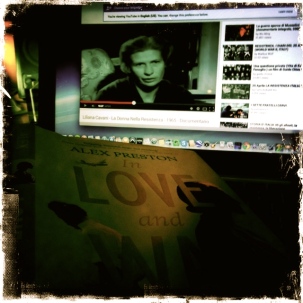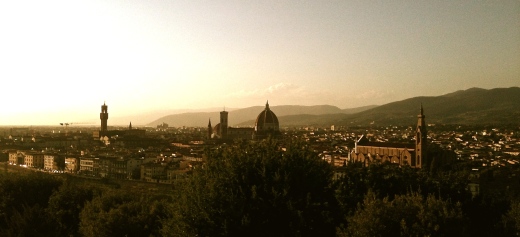In my view, any novel which opens at Croydon Aerodrome is off to a good start. In April 1937, Esmond Lowndes – looking out of a Dragon Rapide, with only the pilot for company – is waved or, rather, saluted off by his ferociously Mosleyite parents. Sent down in disgrace from Cambridge after an affair with a male student, he must redeem himself on a mission for the British Union of Fascists. His destination: Florence.
But this isn’t the beginning of just any novel – this is the beginning of Alex Preston‘s In Love And War.
![Alex Preston [photo © Katie Hall]](https://geezerinhat.files.wordpress.com/2014/11/alex-preston-c-katie-hall.jpg?w=174&h=116)
![]() At Mosley’s behest and with the personal backing of Mussolini, Esmond’s task is to set up Radio Firenze, a Fascist, English-language wireless programme broadcasting, mostly, ‘cultural’ propaganda. But is Esmond really a Fascist? – he seems vague on this point – and what kind of Fascist is he? These days, we use the term mostly pejoratively. But In Love And War sheds light on some of the nuances of opinion within the movement. Some were once seduced by Irredentist poetry and stay true to a vision of order emerging out of the cataclysm of the First World War. Others, in Britain, see Mussolini as a busted flush and believe Nazism is now the only game in town. And then there is the Florentine Blackshirt leader, Mario Carità, for whom Fascism is what he sees on the streets: violence and blood, most of it instigated by him.
At Mosley’s behest and with the personal backing of Mussolini, Esmond’s task is to set up Radio Firenze, a Fascist, English-language wireless programme broadcasting, mostly, ‘cultural’ propaganda. But is Esmond really a Fascist? – he seems vague on this point – and what kind of Fascist is he? These days, we use the term mostly pejoratively. But In Love And War sheds light on some of the nuances of opinion within the movement. Some were once seduced by Irredentist poetry and stay true to a vision of order emerging out of the cataclysm of the First World War. Others, in Britain, see Mussolini as a busted flush and believe Nazism is now the only game in town. And then there is the Florentine Blackshirt leader, Mario Carità, for whom Fascism is what he sees on the streets: violence and blood, most of it instigated by him.

But while Florentine-style Fascism is particularly brutal, not everyone in Florence is Fascist. As Europe sinks into war, Esmond finds himself drawn more and more into the world of the Resistance, whose activities progress from the helping of refugees to espionage and – after German tanks appear on the streets – to full-blown violence. Many of the partisans are Communists. And many of them are women, principal among them, to Esmond, “the admirable stroke terrifying Ada Luizzi”. Rather than to go into further detail here, better to click on this link to hear Alex talk about his book in more depth and with greater eloquence.
What we have is a historical novel, an adventure yarn, a Bildungsroman and a love story. Ultimately, it is the story of Esmond and Ada, but with a large and fascinating supporting cast. And because of all this – while I absolutely loved immersing myself in the world of In Love And War – I did find it a ‘mare to abridge.
But serving redundancy notices to 70,000 words is the easy bit. In studio, reader Carl Prekopp, producer Rosalynd Ward and sound guru Lucinda Mason Brown have collaborated to make In Love And War a compelling listen. Carl has characterised a varied cast with great colour and delivered an impressive all-round piece of storytelling. And as a radio man himself, I think Esmond would approve of the production values.
Happy listening …
Postscript
 I hope you’ll forgive a personal note. The novel ends with an epilogue in which Esmond’s younger brother Rudyard arrives in Florence with the 8th Army in August 1944. The Italian Campaign was the major, probably defining part of my father’s war, and he would have entered Florence in much the same fashion. Unsurprisingly, I’ve thought about him a lot while working on this production.
I hope you’ll forgive a personal note. The novel ends with an epilogue in which Esmond’s younger brother Rudyard arrives in Florence with the 8th Army in August 1944. The Italian Campaign was the major, probably defining part of my father’s war, and he would have entered Florence in much the same fashion. Unsurprisingly, I’ve thought about him a lot while working on this production.
